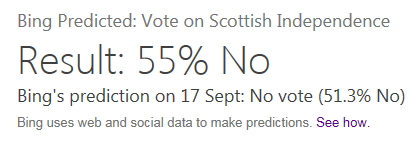Microsoft’s Bing Predicts correctly forecasted the Scottish Independence Referendum vote

Scotland’s Independence referendum has been watched around the world. Areas such as the Basque region of Spain and countries like Belgium with pro-independence groups have been watching Scotland’s potential split from the rest of the UK with interest.
Even Cornwall in the southwestern part of the UK wants "Devolution for one and All". Companies across the US that do business with Scotland have been waiting to see which way the vote would go.
In the end it was a very close race with almost 50:50 Yes/No voter split throughout the process.

The Microsoft Bing Predicts engine, correctly forecasted the result, with only a few percentage points difference. It said:
"Well, we did it. Our model correctly predicted the outcome of the Scottish Referendum: that Scotland would vote "No" and stay in the United Kingdom".
Bing Predicts was beta tested in the UK for this referendum. The prediction engine uses machine-learning models to analyse and detect patterns from a range of big data sources such as the web and social activity in order to make accurate predictions about the outcome of events.
Previously Bing Predicts was used to predict which contestant was likely to be eliminated on American Idol and Dancing with the Stars. It correctly predicted the winner about eight weeks before the show finale.
It also was used to predict the lottery selections in the NBA amateur draft and correctly predicted five out of the top six players chosen. It also correctly predicted 15 from 16 winners of the soccer World Cup in Brazil in 2014.
Tech Pro Research
Bing wanted to test its algorithm against data in the UK to try and project the result ahead of the referendum.
According to Bing its approach is "that winners and losers correspond to popularity".
It defines popularity as "the frequency and sentiment of searches combined with social signals and keywords". It then places these signals into its model, which means it "can predict the outcome of an event with high confidence".
Query sentiments around the Scottish independence vote were analysed, adjusted for biases to try and understand the true opinion expressed by the population of voters.
Terms referring to pro-independence were compared with pro-union terms to determine whether the vote would result in a majority for the Yes (pro-independence) camp, or the "Better Together" No side. It predicted the result that the No camp would win several days ago.
It also discovered other concerns about the split after watching what people were searching for. According to the bing blog activity focused around the following topics:
- CURRENCY: What will happen to the currency in Scotland if it does become independent?
- GEO-POLITICAL: Can the UK veto an independent Scotland EU membership?
- NATIONALITY/IDENTITY: Will Scottish people lose their British nationality after independence?
- BANKS: What happens to RBS if Scotland becomes independent?
- OIL: Who gets the oil with independence?
- BBC: What would happen to the BBC in an independent Scotland?
- What will happen to the open golf after Scottish independence?
- How will Scottish independence affect law firms?
Today Microsoft said that its figures had always predicted that the outcome would be "in a tight race (between 51-58 percent) No". Bing is happy with its success with this and previous projections.
It said that this proves that its "machine-learning model can make good predictions when analyzing data from a wide variety of sources, even in such a special circumstance."
Bing elections correctly predicted that Barack Obama would be re-elected in 2012. Bing has shown it can accurately predict critical results regularly. Perhaps Alex Salmond, first minister of Scotland, and leader of the Scottish National Party for 20 years might like to reflect on Bing's accuracy as he prepares to step down from his post.